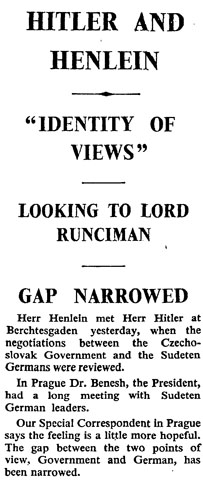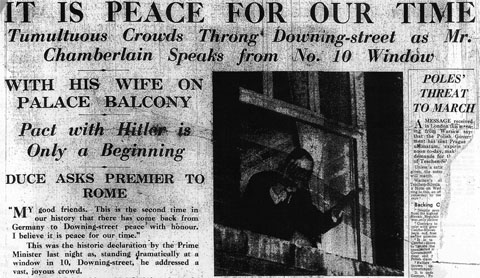
Once again, the Daily Mail has big news (p. 9) that The Times and Manchester Guardian aren’t carrying (they merely have rather anodyne reports that Chamberlain has returned and has been meeting with colleagues); again I suspect it’s because we’re looking at an afternoon edition. The banner headline is truncated above, so here’s the full text:
PREMIER PLANS NEUTRAL STATE FOR CZECHS GUARANTEED BY POWERS
Chamberlain is reported to be ‘fresh, vigorous, and calmly optimistic’ after his 1200-mile round air trip. He went to Germany ‘with the determination to preserve the peace of Europe by drastic measures to reorganise the Czecho-Slovak State’.
First among these proposals was cantonisation of the Sudeten district. The second, and probably most important of them all, was his suggestion that Czecho-Slovakia should become a neutral State, under guarantee of her immediate neighbours and with an overriding guarantee by Britain, France, and Italy.
Thirdly, Mr. Chamberlain was in favour of the principle of the self-determination of the people of Czecho-Slovakia who he believed should have the right, but not necessarily immediately, to state what form of government they would prefer.
It is further stated that ‘there was not much difference of opinion between Mr. Chamberlain and Herr Hitler’. So this all sounds very encouraging.
But the situation in central Europe is still tense. The Manchester Guardian reports (p. 11) that the Czech government first dissolved the Sudeten German party, then changed this to a mere ‘suspension of the party’s activities’. A new organisation, the Bohemian German party, is being formed by four moderate leaders of the old party. The Sudetenland itself is quiet now that the less moderate leaders (including Henlein) have fled to Germany, and everyone in German or mixed German-Czech districts in Bohemia has been ordered to give up their arms in the next 24 hours (presumably irrespective of whether they are Czechs or Germans). The Guardian samples some headlines from the German press:
CZECHS RAID IN SUDETEN GERMAN LAND JUST LIKE THE BOLSHEVIKS IN SPAIN
PRAGUE UNLEASHES BLOODY TERROR
GERMAN POPULATION WITHOUT SELF-DEFENCE
15,000 SUDETEN GERMANS FLEE INTO GERMAN TERRITORY
CZECH MADNESS AND TERROR OVERREACHES ITSELF
MOB RULE IN BOHEMIA
PRAGUE’S CATASTROPHIC POLICY OF MILITARY MEASURES AND TERROR
FROM HOUR TO HOUR THE SUFFERINGS OF THE SUDETEN GERMANS GET WORSE AND WORSE
GERMANY’S [?] PATIENCE ALMOST EXHAUSTED
ALL WARNINGS FALL ON DEAF EARS
50 SOVIET RUSSIAN AEROPLANES HAVE LANDED IN KOENIGGRANTZ [sic]
The press commentary is a bit more encouraging on the other side of the world, in Australia (as reported by The Times, p. 9). The Sydney Morning Herald, the Melbourne Age and the Melbourne Herald all ‘warmly commend’ the statement of the Prime Minister, Joseph Lyons, that Britain has Australia’s full support, ‘up to the hilt’. Indeed, it seems that they wished he’d been even more direct. Of course it is agreed that ‘There was never any doubt that in Great Britain’s hour of need Australia would be there, as always in the past’ (as the SMH put it). Which is clearly a bit of a stretch, since another article on the same page reports that the South Australian Premier, Richard Butler, says that the Czech crisis should not lead to a world war. And the Australasian Council of Trade Unions has resolved to resist any attempt to involve Australia in a European war, after hearing a message from the NSW Premier, Jack Lang:
The Labour [sic] Party, said Mr. Lang, must prepare to organize the Australian people against participation in a European war. If Australia were embroiled in a European war she would be inviting attack from hostile powers, and at the same time would be dissipating her forces of resistance.
Closer to home, the war in Spain is still raging. The Times reports (p. 9) that the battle on the Ebro front is deadlocked, but that the Nationalists are preparing a fresh offensive. Richard Acland, at this time a Liberal MP, has written to the Manchester Guardian (p. 6) to point out that if Britain goes to war with Germany now,
we would find that German guns quickly appeared on both sides of Gibraltar and that German aeroplanes from Northern Spain bombarded the towns of Southeast France.
He thinks there would be two options in that case. The first would be to send weapons and, perhaps, troops to help the Republicans ‘sweep the Germans and the Italians and Franco out of Spain’. The second would be to bribe Italy to turn on the Germans, which would mean sacrificing the Republicans to Franco and would turn many Britons against their own government. On the one hand, this seems to be something of a distraction to the modern reader from the main danger (well, it does to me); on the other, it shows that the Spanish war has a strong hold on the minds of many politically-engaged people. Just because the Czech crisis has flared up does not mean that the Spanish one is going to go away or be forgotten.
ARP preparations are being sped up. The Manchester Guardian reports that the Home Office has called upon local authorities to review their ARP progress, and that ‘many of those meetings were far from happy’ (p. 12). Evidently, ‘A really serious threat to peace was needed to make Lancashire take interest in the Government’s Air Raid Precautions scheme’. Partly this is due to apathy on the part of the public, who have not exactly been rushing to volunteer as air wardens (though the numbers are up, with the current threat of war). But many towns have not even undertaken a census to determine how many gas masks they will need for their citizens, and Bolton, for example, with a population of 174,000, doesn’t even have any yet. It’s expecting 100,000 ‘next month’ — bad luck if the Luftwaffe decides it can’t wait that long …
![]() This work is licensed under a Creative Commons Attribution-NonCommercial-NoDerivatives 4.0 International License.
Permissions beyond the scope of this license may be available at http://airminded.org/copyright/.
This work is licensed under a Creative Commons Attribution-NonCommercial-NoDerivatives 4.0 International License.
Permissions beyond the scope of this license may be available at http://airminded.org/copyright/.






Pingback: Airminded · Saturday, 24 September 1938